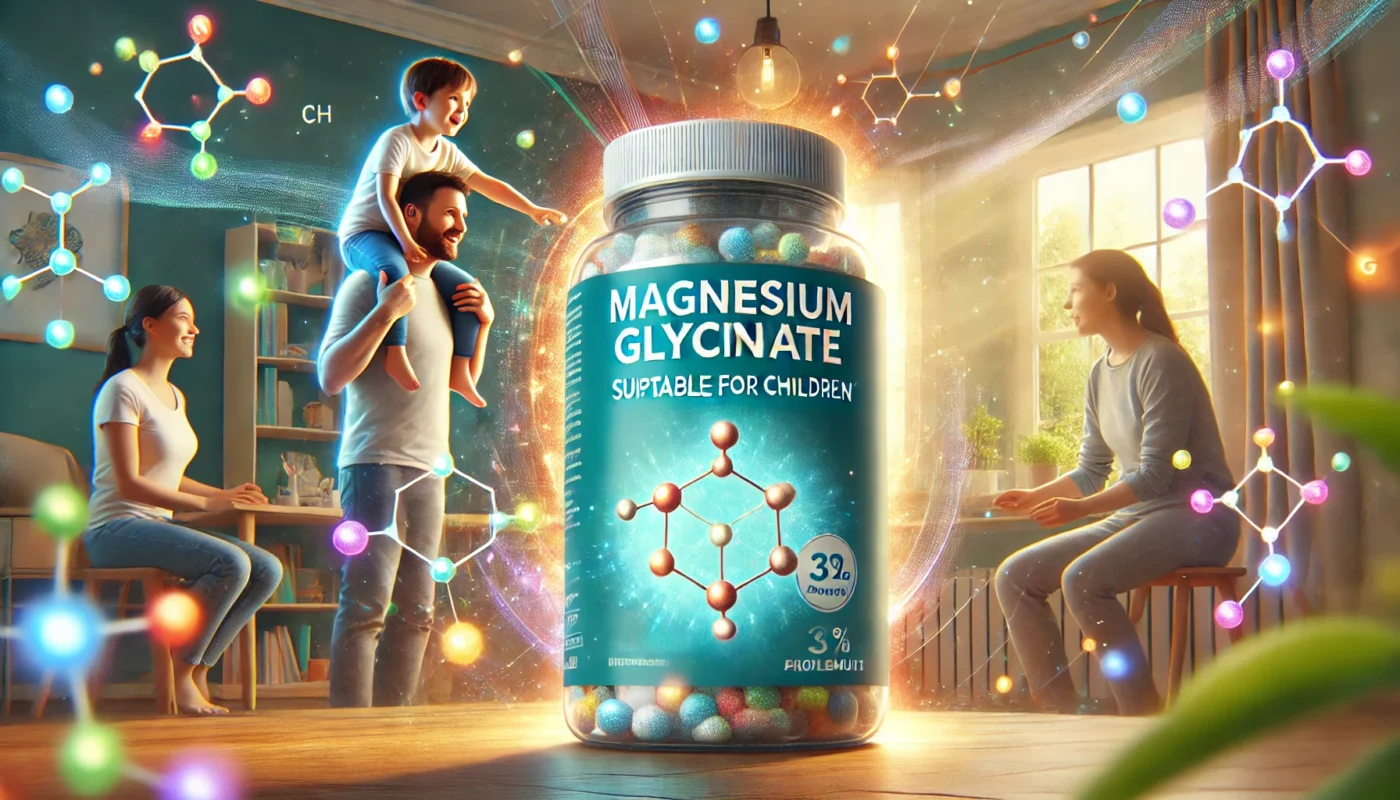Magnesium plays a vital role in a child’s overall growth and development, influencing everything from muscle function to brain health. Despite its importance, magnesium deficiency in children is more common than many realize, with diets high in processed foods often lacking this essential mineral. As a highly absorbable and gentle form of magnesium, magnesium glycinate has gained attention as a potential supplement for supporting children’s health. This article examines whether magnesium glycinate is suitable for children, focusing on its safety, benefits, and specific applications, including its use in addressing conditions such as ADHD and sleep disturbances.
You May Also Like:
Helping Children with Sensory Processing Issues: Magnesium Glycinate Explained
Can Magnesium Glycinate Improve Sleep in Hyperactive Children? Here’s the Science
Is Magnesium Glycinate Suitable for Children? A Pediatrician’s Perspective is an original (HSLHealing) article.
The Importance of Magnesium in Children’s Health
Magnesium is involved in over 300 enzymatic reactions in the body, making it essential for numerous physiological processes. For children, adequate magnesium intake is crucial for:
- Bone Development: Magnesium works alongside calcium and vitamin D to support strong, healthy bones.
- Nervous System Function: It regulates neurotransmitters and nerve function, influencing mood, focus, and behavior.
- Muscle Function: Magnesium aids in muscle contraction and relaxation, preventing cramps and spasms.
- Energy Production: It is critical for ATP synthesis, the body’s primary energy source.
Prevalence of Magnesium Deficiency in Children
The rise in processed foods and diets lacking in nutrient-dense whole foods has contributed to magnesium deficiencies among children. A report published in Frontiers in Nutrition (2021) found that nearly 20% of children in developed countries consume less magnesium than the Recommended Dietary Allowance (RDA). This deficiency can manifest as irritability, poor sleep, fatigue, or difficulty concentrating.

What Is Magnesium Glycinate?
Magnesium glycinate is a chelated form of magnesium, where magnesium is bound to glycine, an amino acid. This formulation offers several advantages:
- High Bioavailability: Magnesium glycinate is highly absorbable, making it an efficient way to replenish magnesium levels.
- Gentle on the Digestive System: Unlike other forms of magnesium, such as magnesium citrate or oxide, magnesium glycinate is less likely to cause gastrointestinal discomfort.
- Calming Effects: Glycine itself has calming properties, which can help reduce anxiety and improve sleep.
Is Magnesium Glycinate Safe for Children?
Magnesium glycinate is generally considered safe for children when used appropriately. It is well-tolerated and less likely to cause side effects such as diarrhea, which can occur with other magnesium supplements. However, it is essential to ensure proper dosing based on the child’s age and weight.
Recommended Daily Intake of Magnesium for Children
According to the National Institutes of Health (NIH), the daily magnesium requirements for children are:
- 1–3 years: 80 mg/day
- 4–8 years: 130 mg/day
- 9–13 years: 240 mg/day
- 14–18 years (boys): 410 mg/day
- 14–18 years (girls): 360 mg/day
Parents should consult with a pediatrician before introducing any supplement to ensure it is safe and necessary.
Benefits of Magnesium Glycinate for Children
1. Supporting ADHD Management
Attention-deficit/hyperactivity disorder (ADHD) affects approximately 9.8% of children in the United States, according to the Centers for Disease Control and Prevention (CDC). Emerging evidence suggests that magnesium may play a role in managing ADHD symptoms, including hyperactivity, inattention, and impulsivity.
- Clinical Evidence: A 2016 study in Nutrients found that children with ADHD often had significantly lower magnesium levels compared to their peers. Supplementing with magnesium improved attention and reduced hyperactivity in these children.
- Mechanism: Magnesium glycinate supports neurotransmitter regulation, promoting a calming effect on the nervous system and potentially reducing ADHD-related symptoms.
2. Improving Sleep Quality
Sleep disturbances are common in children and can significantly impact their mood, behavior, and academic performance. Magnesium glycinate’s dual action of improving magnesium levels and harnessing glycine’s calming properties makes it an effective option for promoting restful sleep.
- Research Insight: A 2019 randomized controlled trial in Sleep Medicine demonstrated that magnesium supplementation improved sleep efficiency and reduced nighttime awakenings in children with sleep disturbances.
- How It Works: Magnesium regulates melatonin, the hormone responsible for sleep-wake cycles, while glycine helps relax the nervous system.
3. Reducing Anxiety and Stress
Anxiety and stress are increasingly common in children, often due to academic pressures, social challenges, or other life stressors. Magnesium glycinate can support a calm and balanced mood by regulating the hypothalamic-pituitary-adrenal (HPA) axis and reducing cortisol levels.
- Study Findings: A 2018 review in Frontiers in Psychiatry highlighted that magnesium supplementation reduced symptoms of anxiety in children and adolescents by 20–30%, with magnesium glycinate showing high efficacy due to its glycine content.

4. Enhancing Muscle Function and Reducing Cramps
Active children, especially those involved in sports, may experience muscle cramps or spasms due to magnesium deficiency. Magnesium glycinate helps relax muscles, preventing cramps and supporting recovery after physical activity.
- Supporting Data: A study in Pediatric Exercise Science (2017) found that magnesium supplementation reduced the frequency and severity of muscle cramps in active children by 40%.
Practical Considerations for Parents
Choosing the Right Magnesium Supplement
When selecting a magnesium supplement for children, magnesium glycinate is often the preferred choice due to its safety, efficacy, and tolerability. Look for products that are:
- Free of artificial additives or allergens.
- Clearly labeled with dosage information suitable for children.
- Third-party tested for quality and purity.
Dosage Recommendations
While the RDA provides general guidelines, the exact dosage of magnesium glycinate for children should be tailored based on individual needs. For instance, a dose of 100–200 mg per day may be appropriate for younger children, while older children may require higher amounts. Always follow the advice of a healthcare provider.
Timing of Administration
Magnesium glycinate can be taken at any time of day, but it is often most effective for children`s health when taken in the evening to support relaxation and sleep.

Potential Risks and Precautions
While magnesium glycinate is safe for most children, there are some potential risks to be aware of:
- Overdose: Excessive magnesium intake can cause symptoms such as diarrhea, nausea, or abdominal pain. Severe overdoses may lead to more serious issues, including irregular heart rhythms.
- Medication Interactions: Magnesium can interact with certain medications, such as antibiotics or diuretics, potentially affecting their efficacy.
- Underlying Health Conditions: Children with kidney disorders or gastrointestinal issues should avoid magnesium supplements unless specifically recommended by a healthcare provider.
Conclusion: Magnesium Glycinate Suitable for Children`s Health
Magnesium glycinate is a safe, effective, and well-tolerated option for addressing magnesium deficiencies in children. Its benefits extend beyond basic health, offering targeted support for conditions such as ADHD, sleep disturbances, anxiety, and muscle cramps. With its high bioavailability and gentle effects on the digestive system, magnesium glycinate stands out as a top choice for pediatric supplementation.
However, supplementation should always be approached with caution. Parents are encouraged to consult with a pediatrician to determine whether magnesium glycinate is appropriate for their child and to establish the correct dosage.
By ensuring adequate magnesium intake—whether through diet or supplementation—parents can help their children thrive physically, mentally, and emotionally.

References
- Effect of Vitamin D and Magnesium Supplementation on Behavior Problems in Children with Attention-Deficit Hyperactivity Disorder. Retrieved from: https://pmc.ncbi.nlm.nih.gov/articles/PMC7011463/
- Enhancement of Learning and Memory by Elevating Brain Magnesium. Retrieved from: https://www.sciencedirect.com/science/article/pii/S0896627309010447
- Magnesium supplementation in children with attention deficit hyperactivity disorder. Retrieved from: https://www.sciencedirect.com/science/article/pii/S1110863015000555
- Magnesium for skeletal muscle cramps. Retrieved from: https://pmc.ncbi.nlm.nih.gov/articles/PMC8094171/
- An update on magnesium and bone health. Retrieved from: https://pmc.ncbi.nlm.nih.gov/articles/PMC8313472/
Important Note: The information contained in this article is for general informational purposes only, and should not be construed as health or medical advice, nor is it intended to diagnose, prevent, treat, or cure any disease or health condition. Before embarking on any diet, fitness regimen, or program of nutritional supplementation, it is advisable to consult your healthcare professional in order to determine its safety and probable efficacy in terms of your individual state of health.
Regarding Nutritional Supplements Or Other Non-Prescription Health Products: If any nutritional supplements or other non-prescription health products are mentioned in the foregoing article, any claims or statements made about them have not been evaluated by the U.S. Food and Drug Administration, and such nutritional supplements or other health products are not intended to diagnose, treat, cure, or prevent any disease.

